

Census Data Show Americans Are Still Stuck at Home - Up Front Blog. Americans used to be a nomadic bunch, uprooting themselves for better jobs, better housing, and better lives, but new Census data again confirms a trend first observed at the nadir of the recession: We’re becoming a nation of homebodies, and not by choice.
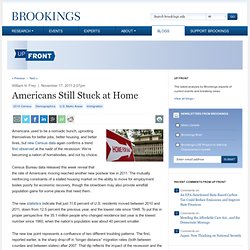
Census Bureau data released this week reveal that the rate of Americans moving reached another new postwar low in 2011. The mutually reinforcing constraints of a stalled housing market on the ability to move for employment bodes poorly for economic recovery, though the slowdown may also provide windfall population gains for some places that need them. The new statistics indicate that just 11.6 percent of U.S. residents moved between 2010 and 2011, down from 12.5 percent the previous year, and the lowest rate since 1948. To put this in proper perspective: the 35.1 million people who changed residence last year is the lowest number since 1960, when the nation’s population was about 40 percent smaller.
Who is the Millennial Generation? What works Pew Research has created a tidy series of interactive graphics to describe the demographic characteristics of American generational cohorts from the the Silent Generation (born 1928 – 1945) through the Boomers (born 1946 – 1964), Generation X (1965 – 1980) [this is a disputed age range - a more recent report from Pew suggests that Gen Xers were born from 1965-1976), and the Millennial Generation (born 1981+ [now defined as being born between 1977 and 1992]).
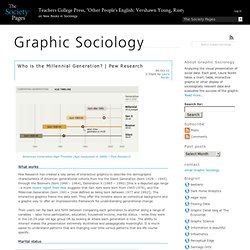
The interactive graphics frame the data well. They offer the timeline above as contextual background and a graphic way to offer an impressionistic framework for understanding generational change. Then users can flip back and forth between comparing each generation to another along a range of variables – labor force participation, education, household income, marital status – while they were in the 18-29 year old age group OR by looking at where each generation is now. Marital status Labor force participation References. The 9/11 Generation. SOURCE: AP/Chao Soi Cheong Smoke pours off one of the towers of the World Trade Center as flames explode from the second one as it is struck by a plane Tuesday, September 11, 2001. By Eleni Towns | September 8, 2011 My first day of high school was September 11, 2001. Thom and Jess Rainer look at future of Millennial Generation in new book. The Bridger Generation.
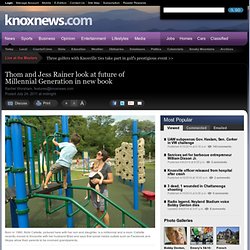
Generation Y. Generation XX. Echo Boom. Boomer Babies. Generation Tech. Adults Only « CEDAM blog. The Martin Luther King Jr National Day of Service is a call for people to volunteer some free time and energy to give back.

The Michigan Foreclosure Prevention Corps members chose from a variety of projects across the state to help their fellow man and communities. Below, two members recount their MLK National Day of Service experiences. Helping to Feed Volunteers at the Greater Lansing Food Bank. Top 10 States for Economic Growth, Based on Millennial Pop. MCF "Think Michigan" Study. Truth, Justice and the Millennial Way.
Study: Millennials Value 'Social Economy' Anna Maria Virzi | May 25, 2011 | 2 Comments inShare112 McCann Worldgroup says brands must help young people share and narrate their lives.
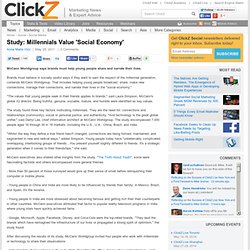
Brands must behave in socially useful ways if they want to earn the respect of the millennial generation, contends McCann Worldgroup. That includes helping young people broadcast, share, make new connections, manage their connections, and narrate their lives in the "social economy. " "The values that young people seek in their friends applies to brands," said Laura Simpson, McCann's global IQ director. The study found three key factors motivating millennials. "Whilst the way they define a true friend hasn't changed, connections are being formed, maintained, and segmented in new and radical ways," added Simpson. McCann executives also shared other insights from the study, "The Truth About Youth"; some were fascinating factoids and others encompassed more general themes. - Kate Krontiris, former advisor in the U.S.
Generations Keynote Speakers, Experts, Authors, Managing Baby Boomers, Gen Xers and Millennials. Who Are the Millennials? This post was written by Jenny Urbano, our Social Media Manager.

Millennial Makeover. Millennials: Confident. Connected. Open to Change. Executive Summary Generations, like people, have personalities, and Millennials — the American teens and twenty-somethings who are making the passage into adulthood at the start of a new millennium — have begun to forge theirs: confident, self-expressive, liberal, upbeat and open to change.
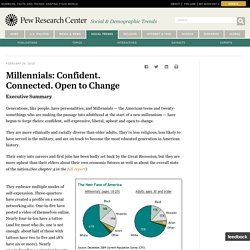
They are more ethnically and racially diverse than older adults. They’re less religious, less likely to have served in the military, and are on track to become the most educated generation in American history. Their entry into careers and first jobs has been badly set back by the Great Recession, but they are more upbeat than their elders about their own economic futures as well as about the overall state of the nation. (See chapter 4 in the full report) They embrace multiple modes of self-expression.
Nearly one-in-four have a piercing in some place other than an earlobe — about six times the share of older adults who’ve done this. They get along well with their parents.